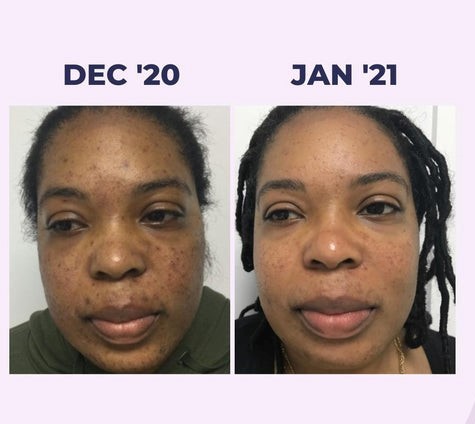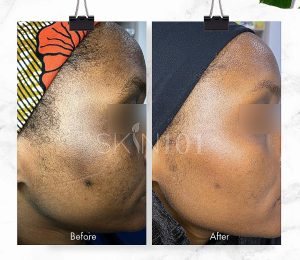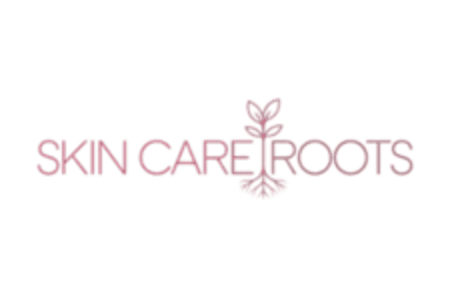Hyperpigmentation treatment for black skin

Hyperpigmentation can be a common issue for many people. For those with black skin, it requires special care and understanding.
Finding the right treatment of Hyperpigmentation treatment for black skin is crucial for maintaining healthy skin tone. Hyperpigmentation happens when certain areas of the skin become darker than the surrounding skin. This happens due to excess melanin production. Black skin is rich in melanin.
However, it also means that any skin injury or inflammation can lead to dark spots. Various treatments are available, including topical creams, chemical peels, and laser therapy. Each option works differently and may suit different needs. It’s vital to choose treatments that consider the unique characteristics of black skin to achieve the best results.
Causes Of Hyperpigmentation
Hyperpigmentation can be a particularly challenging skin concern for Black skin. Dark spots, uneven skin tone, and discoloration may develop due to several factors. Let’s take a closer look at the primary causes of hyperpigmentation.
Genetic Factors in Hyperpigmentation treatment
Genetics play a significant role in hyperpigmentation. Melanin is a key element here. It determines skin color and its production level. Black skin has more melanin, making it prone to pigmentation issues. This natural abundance increases the chance of developing dark spots. Family history can also influence susceptibility. If parents or grandparents had pigmentation issues, it may pass on.
Environmental Influences in Hyperpigmentation treatment
Environmental factors greatly impact skin pigmentation. Sun exposure is a primary trigger.UV rays trigger melanin production, which can result in dark patches on the skin. Pollution is another contributing factor—it can irritate the skin, leading to inflammation and increased pigmentation. Harsh weather conditions can also affect skin health. Cold or dry air may damage skin’s natural barrier.
Types Of Hyperpigmentation
Hyperpigmentation in black skin includes melasma, post-inflammatory hyperpigmentation, and sun-induced dark spots. Effective treatments include gentle exfoliants, vitamin C serums, and sun protection to help reduce discoloration.
Understanding the types of hyperpigmentation is crucial, especially when seeking effective treatment for black skin. Each type has unique causes and characteristics, so knowing what you’re dealing with is the first step in addressing it. Let’s dive into the specifics of melasma and post-inflammatory hyperpigmentation, two common types of hyperpigmentation affecting individuals with darker skin tones.
Melasma
Melasma typically shows up as dark, uneven patches on the face.It’s more frequently seen in women and is often triggered by hormonal changes, like those that occur during pregnancy or from using birth control.. If you’ve ever wondered why those pesky patches show up on your forehead or cheeks, hormones might be the culprit. Sun exposure can make melasma worse. Wearing sunscreen daily is non-negotiable if you’re dealing with this type of hyperpigmentation. Have you noticed your melasma getting darker after spending time in the sun on vacation? That’s why sun protection is essential. Treating melasma usually requires a combination of topical creams and lifestyle changes. Ingredients such as hydroquinone and azelaic acid can be effective in lightening the dark patches. Think about integrating these into your skincare routine to see gradual improvement.

Hyperpigmentation treatment for black skin
Post-inflammatory Hyperpigmentation treatment for black skin
This could be from acne, eczema, or even a minor cut. It’s your skin’s way of saying, “Remember that time you picked at that pimple?”. The dark spots left behind can be frustrating, but they usually fade over time. However, patience is key, as it can take months for them to disappear completely. To speed up the process, consider using products with ingredients like retinoids or glycolic acid.Preventing PIH starts with treating your skin gently. Avoid picking at blemishes and use soothing products to calm inflammation. Have you tried incorporating a gentle cleanser and moisturizer to keep your skin calm and less prone to PIH? Understanding these types can help you tailor your approach to treating hyperpigmentation. What steps will you take to tackle your specific type? By targeting the cause, you can work towards clearer, more even-toned skin.
Challenges For Hyperpigmentation treatment for black skin
Hyperpigmentation treatment can be complex for black skin. Melanin-rich skin faces unique challenges. These issues require careful consideration. Understanding these challenges is crucial. It helps in selecting effective treatments.
Sensitivity Issues in Hyperpigmentation treatment for black skin
Black skin is often sensitive. Products can cause irritation. This can worsen hyperpigmentation. Gentle formulas are essential. They reduce the risk of adverse reactions. Look for hypoallergenic options.
Scar Risk
Scarring is a common concern. Black skin can scar easily. Especially from aggressive treatments. Laser therapy might increase this risk. Choose non-invasive methods whenever possible. Chemical peels should be mild. Healing time is important. It allows skin to recover properly.
Topical Treatments
Hyperpigmentation can be a challenging skin concern, especially for those with Black skin. Topical treatments offer promising solutions to tackle this issue, helping to even out skin tone and reduce dark spots. These treatments can be a game changer in your skincare routine, offering visible results.Let’s explore the most effective topical treatments currently available.
Hydroquinone
Hydroquinone is a popular choice for treating hyperpigmentation.Dermatologists often recommend it for its effectiveness.
Start with a lower concentration, like 2%, to see how your skin reacts. You can find over-the-counter products with this ingredient. If your skin tolerates it well, your dermatologist might suggest a higher percentage.
Consistency is key with hydroquinone. Apply it twice daily for best results. But be sure to follow up with sunscreen, as hydroquinone can make your skin more sensitive to the sun.
Retinoids
Retinoids are another powerful tool in the fight against hyperpigmentation. They speed up cell turnover, helping new, even-toned skin emerge. You may have heard of retinol, a popular type of retinoid commonly used in skincare products.
Introduce retinoids slowly into your routine. Start by applying them once or twice a week. Gradually increase usage as your skin adjusts. This helps reduce irritation, which can make pigmentation worse.
Retinoids can make your skin more sensitive, so always pair them with a good moisturizer. Use them at night, as they can break down in sunlight. Is retinoid a part of your skincare arsenal yet?
Natural Remedies
Natural remedies can help reduce hyperpigmentation in black skin. Aloe vera soothes and lightens dark spots. Turmeric masks improve skin tone with regular use. Green tea offers antioxidants, promoting even skin.
Dealing with hyperpigmentation can be challenging, especially for those with black skin. However, nature offers some gentle remedies that can help brighten and even out your skin tone. These natural solutions are often affordable and accessible, making them a great starting point for addressing pigmentation concerns. ###
Aloe Vera
Aloe vera is a popular plant known for its soothing and healing properties. Its gel contains compounds that may help reduce dark spots and even out your skin tone. Simply apply fresh aloe vera gel to the affected areas before bedtime and leave it on overnight. Have you ever wondered why aloe vera is called the “plant of immortality”? Some believe it’s because of its ability to rejuvenate the skin. With consistent use, you might notice a gradual improvement.
Vitamin C
Vitamin C is a powerhouse antioxidant that can brighten your skin and reduce pigmentation. It’s commonly found in serums and creams, but you can also use natural sources like lemon juice or orange peel. Applying a vitamin C-rich serum daily can help lighten dark spots over time. Imagine waking up to a more radiant complexion. Just remember to use sunscreen during the day, as vitamin C can make your skin more sensitive to the sun. Natural remedies like aloe vera and vitamin C can be effective, but patience is key. It might take weeks or even months. Are you ready to embrace a natural approach to hyperpigmentation treatment?
Professional Treatments
Hyperpigmentation can be particularly challenging to manage for individuals with Black skin. Professional treatments offer effective solutions. Dermatologists can tailor treatments to your skin’s unique needs. These treatments target stubborn pigmentation and promote even skin tone.
Chemical Peels
Chemical Peels removes the top layers, revealing fresher skin beneath. For black skin, mild peels are recommended. They reduce the risk of irritation or discoloration. Salicylic acid and glycolic acid are main ingredients. These acids help lighten dark spots and improve skin texture.
A trained professional should perform chemical peels. This ensures safety and optimal results.
Laser Therapy
Laser therapy targets deep layers of skin with precision. It breaks down excess melanin, reducing pigmentation. Not all lasers suit black skin. Safe options include Nd:YAG and fractional lasers. These types minimize risks of further pigmentation issues.
Laser therapy sessions vary based on individual needs. A dermatologist will assess and recommend a suitable plan. Post-treatment care is crucial for healing. Sunscreen and moisturizers help protect the skin.
Consult a professional to explore these options. Besides They can provide guidance and customize treatment plans. Proper care can enhance skin health and appearance.
Preventive Measures
Undoubtedly Hyperpigmentation, especially for Black skin, can be a challenging issue. One of the most effective ways to tackle it is through preventive measures. By understanding what affects your skin and taking steps to protect it, also you can significantly reduce the chances of hyperpigmentation. Also Prevention is always better than cure, right? Let’s look at some practical ways.
Sun Protection
Sun exposure is a major cause of hyperpigmentation. Besides Even on cloudy days, UV rays can pass through and impact your skin. Also You might think that melanin-rich skin is naturally protected from the sun, but it still needs care.
Wear sunscreen daily. Moreover Choose a broad-spectrum SPF 30 or higher. Moreover Many people overlook this step, assuming it’s unnecessary. However, it’s essential for preventing dark spots.
Besides Consider wearing hats or using umbrellas for extra protection.
Dietary Changes
What you eat can impact your skin’s health. Moreover Foods high in vitamins and antioxidants support a healthy complexion.
Add fruits like berries and citrus to your diet—they’re rich in vitamin C, which plays a key role in skin repair . Also Leafy greens and nuts are also beneficial due to their antioxidant properties.
Avoid excessive sugar and processed foods. Moreover These can lead to inflammation, worsening hyperpigmentation.
Preventing hyperpigmentation involves a mix of sun protection and smart dietary choices. Besides Adapting these habits can not only help in maintaining a clear complexion but also boost your overall skin health. What preventive measures will you take today to protect your skin?
Choosing The Right Treatment
Choosing the right treatment for hyperpigmentation on black skin can be challenging. Moreover The goal is to find a treatment that is effective yet gentle on the skin. Also Taking the time to understand your options can lead to healthier, clearer skin.
Consulting A Dermatologist
Consulting a dermatologist is a wise first step. Moreover Dermatologists have the expertise to assess your skin’s needs. They can identify the root causes of hyperpigmentation. Besides With their guidance, you can avoid ineffective or harmful treatments.
Personalized Approach
A personalized approach is key in treating hyperpigmentation. Your skin’s reaction to treatments can vary. A tailored plan considers your skin’s specific characteristics. Moreover This includes factors like skin tone and sensitivity.
It’s crucial to monitor progress and adjust treatments as needed. Undoubtedly Regular follow-ups with your dermatologist can help track improvements. Also This ensures the treatment remains beneficial for your skin.
Frequently Asked Questions
What Is The Fastest Way To Cure Hyperpigmentation?
Laser treatments and chemical peels are the fastest ways to cure hyperpigmentation. Moreover Consult a dermatologist for personalized advice. Undoubtedly Daily use of sunscreen prevents further darkening. Besides Incorporate vitamin C serums and retinoids into your skincare routine for best results.
What Gets Rid Of Dark Hyperpigmentation?
Use topical treatments with vitamin C or retinoids. Moreover Apply sunscreen daily to protect skin. Consider chemical peels, microdermabrasion, or laser therapy for stubborn cases. Also Consult a dermatologist for personalized advice. Maintain a consistent skincare routine for best results.
How Can I Lighten My Dark Black Skin?
Besides Consult a dermatologist for safe skin-lightening options. Also Use sunscreen daily to prevent further darkening. Maintain a healthy diet rich in antioxidants. Moreover Regularly exfoliate to remove dead skin cells. Prioritize skin health and embrace your natural beauty.
Can A Dermatologist Clear Hyperpigmentation?
Yes, a dermatologist can help clear hyperpigmentation. Moreover these treatments reduce dark spots and improve skin tone. Also Consult a dermatologist for personalized advice and effective solutions tailored to your skin type and condition.
Conclusion
Treating hyperpigmentation in black skin requires patience and care. However Consistent use of gentle products helps. Always choose treatments safe for melanin-rich skin. Also Consult with a dermatologist for personalized advice. Protect skin daily with sunscreen. Besides This prevents further dark spots.
Listen to your skin’s needs. Also Avoid harsh chemicals. Embrace natural remedies where possible. Your skin’s health is worth the effort. Progress may be slow, but it’s achievable. Undoubtedly Celebrate small victories along the journey. Invest time in understanding your skin. Importantly Results will follow with dedication and care. Read more







